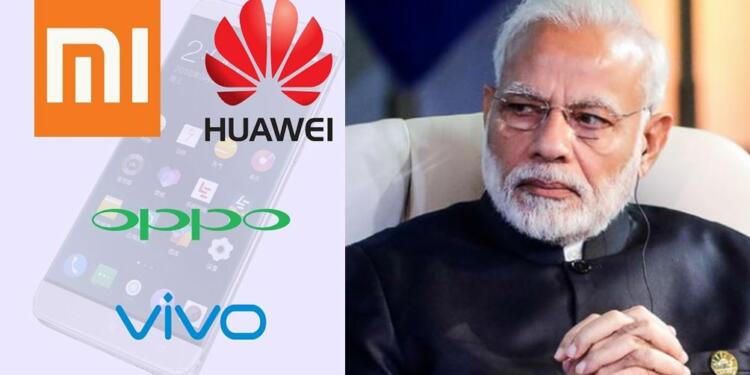‘Hum na kisi se ankh jhuka kar ke baat karenge, na hi hum ankh utha kar ke baat karenge, hum ankh mila kar ke baat karenge’, This is the saying of PM Narendra Modi which made India believe that a new century is beginning with India having its own dignified place on the global stage. With India-Russia bonhomie on one side and Modi-Trump friendship on the other, it was quite evident that India is carving out its own niche in the world order. Then Galwan happened and India made sure that China pays for its misadventures. But, the current scenario seems different. The Modi government took a very hard stance when it came to countering the Chinese influence, but now it seems to be compromising with its stand, economically, to say the least.
India was supposed to ban low-cost Chinese smartphones
The Modi government has been on a war footing when it came to countering the Chinese influence. Last year, approximately 267 China based apps were banned in several phases citing threats to national security.
As the aforementioned number was on the rise, another good news kicked in. India was supposed to ban low-cost Chinese smartphones, as stated in some reports released in the month of August. Reports claimed that an upcoming government order will prohibit any Chinese phone worth less than Rs 12,000 from entering Indian markets. The move was celebrated as it aimed to end the dominance of Chinese companies like Oppo, Vivo, and Xiaomi among others in the low-cost smartphone segment.
The latest raids on Oppo and Xiaomi are evidence that the government is closely monitoring Chinese businesses, while keeping a tight check on them. Some Chinese smartphone manufacturers’ offices were recently raided, and the ED even filed charges against them for potential tax evasion.
India has no such plan, clarifies the IT Ministry
However, the Government of India has dismissed the reports claiming the ban of low-cost Chinese smartphones giving the Chinese companies a freerun in the Indian market. The Union Minister of Information and Technology, Rajeev Chandrashekhar emphasised that the Indian government has asked the makers to increase the exports from India and there are no proposals in consideration to restrict the companies from the neighbouring country. The minister said, “Their supply chain, specially components supply chain, need to be more transparent and much more open.” (sic)
The Minister, although accepted that Indian companies do have a role to play in the country’s electronic system, that does not mean exclusion of foreign brands.
Cheap Chinese pocket bombs are killing the Indian players
The Minister may think that Indian companies can grow parallely with the cheap Chinese pocket bombs. But, the truth stands far away from it. At present, nearly 70 percent of India’s smartphone market is dominated by Chinese players. And to the contrary Indian handset manufacturers jointly account for less than 1 per cent. Anyone of us going to a mobile shop will end up buying an Oppo, Vivo, Xiaomi or a Realme handset. On the other hand, homegrown brands like Micromax, Intex, Lava and Karbonn have been literally kicked out from the market by these Chinese companies. But how did it happen?
The menace of cheap Chinese smartphones
The cheap Chinese smartphones are products of cheap labour due to incessant exploitation of workers by the CCP, the Chinese Communist Party. The Chinese government also subsidizes its local companies to lower the cost of export and to destroy the indigenous markets of the destination countries. As a result, the final cost comes down, and cheap low-quality phones are produced. They are loaded with multiple features like camera module, finger sensor, high-definition screens among others, however, they are highly unreliable. Chinese phones are pocket bombs which can explode anytime. The Indian players busy in maintaining the quality of their product could not withstand the fierce competition, thus facing an exit from the market.
Adware, Bloatware and Private info
To add on, the Chinese handsets are a danger to personal data of Indian users as their low prices are enabled by bloatware, which is a system of pre-installed apps on a smartphone. If you purchase such a mobile handset, you cannot uninstall or even disable such pre-installed apps. These unnecessary apps compromise on the functionality of your smartphone and also expose it to serious security risks.
One of the reasons of the low cost of Chinese smartphones is that they are infested with adware too. They recover their losses by showing excessive and unnecessary ads to their customers by infesting adware in the phone’s user interface (UI).
Most of the Chinese phones come with customized UI system which helps these companies to steal private information of the user and then they sell it to mass marketing companies as we know in the modern world ‘Data is the new Oil’.
Thus, the Modi government must give it a second thought and should reserve the entry-level market for local players only. Only in this way, it can not only save the citizens and their data but also will make India ‘Aatmanirbhar’ (self-reliant) in the mobile manufacturing sector.
Support TFI:
Support us to strengthen the ‘Right’ ideology of cultural nationalism by purchasing the best quality garments from TFI-STORE.COM
























